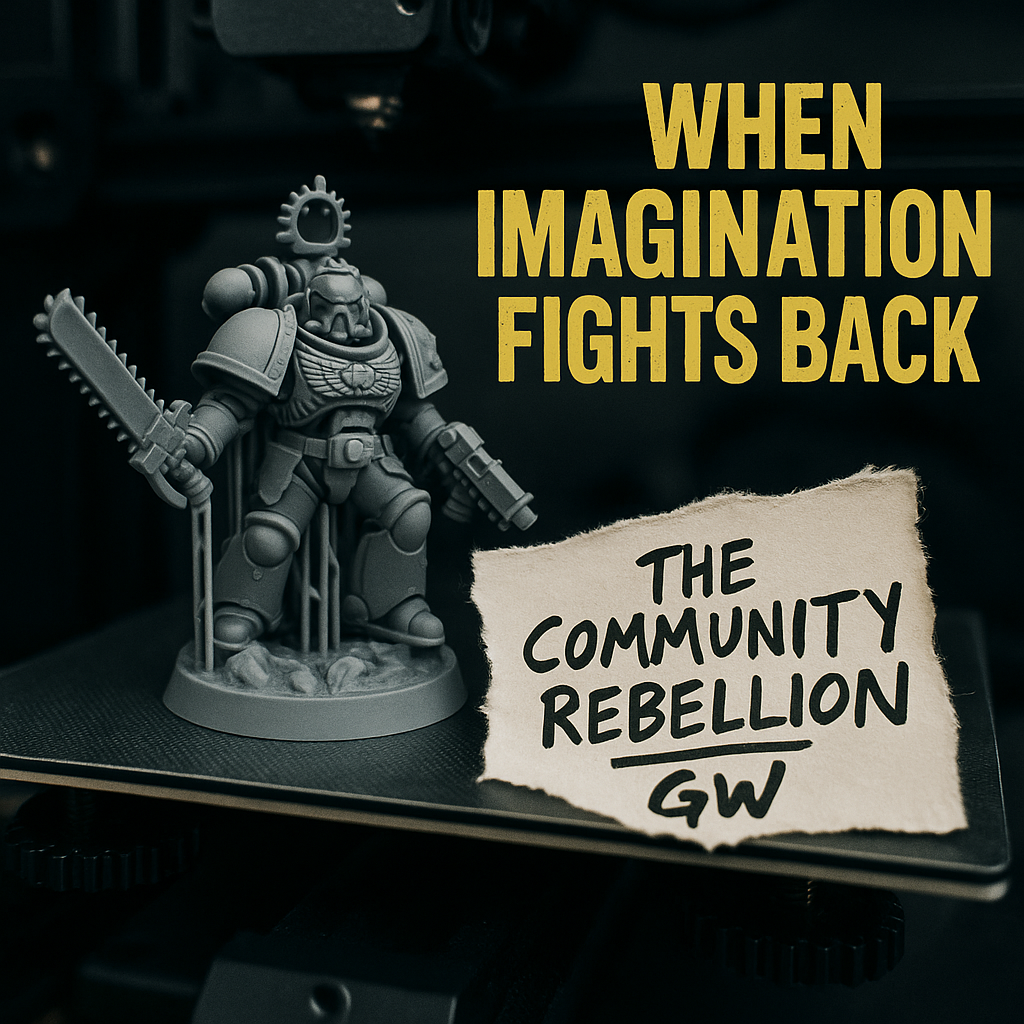When Imagination Fights Back
“You can’t sue an idea. You can only chase the people who believe in it.”

If Part I was about control and Part II about adaptation, this one is about revolt.
The community that Games Workshop built — painters, lore junkies, collectors, storytellers — has evolved into something that no corporation can fully contain. Fans are not customers anymore. They are co-authors. And the line between creation and consumption has dissolved.
This is not the story of piracy. It’s the story of participation.
The People in the Shadows of the Forge
For decades, Warhammer thrived because of unofficial devotion. Every player added their own brushstroke to the myth. Home rules. Kitbashes. Fan fiction. Unlicensed novels that spread through forums like folklore.
That spirit didn’t die when the printers arrived. It just gained hardware.
Hobbyists now sculpt new factions, remix old ones, build terrain out of scanned relics. The energy that once fuelled painting tables has become a digital movement — thousands of artists, each creating in defiance of permission.
On Reddit threads like r/PrintedWarhammer, entire armies are born, printed, painted, and shared. Their creators talk about lighting angles, print layer heights, resin mix ratios — the alchemy of plastic reborn as participation.
They aren’t waiting for GW anymore. They are doing what the company taught them: creating worlds.
“The rebellion doesn’t look like pitchforks. It looks like printers quietly humming at 3AM.”
Economics of the Underground
The data is anecdotal but telling.
3D printing hobby groups on Facebook and Discord have exploded in membership since 2022. STL repositories like Cults3D and MyMiniFactory now host tens of thousands of files tagged Warhammer-compatible.
Not all are bootlegs. Many are original designs inspired by the same aesthetic ecosystem. But to the market, they are indistinguishable competition.
Let’s do a rough projection:
- The global 3D printing market for consumer use surpassed $5 billion in 2024, growing at 20% annually.
- The tabletop miniature market sits around $12 billion, with GW commanding roughly a third of it.
- Even if 3% of that audience migrates to self-printing, that’s hundreds of millions in diverted value.
Those are numbers that turn fear into policy.
From Devotion to Disobedience
There’s a strange irony here. The same loyalty that made Games Workshop powerful has birthed its most capable rivals.
The “fan economy” isn’t parasitic; it’s generative. Players innovate because they love the universe. They spend hundreds of unpaid hours sculpting, painting, and designing armies that exist entirely within Warhammer’s mythos.
They aren’t trying to replace Games Workshop. They’re trying to participate in the story.
When GW threatens them with legal action, it feels like excommunication. The corporation mistakes worship for heresy.
“The rebellion is not against Warhammer. It is for Warhammer — for the right to make it your own.”
The Emotional Economics of Belonging
Money is not the only currency in this fight. There’s also meaning.
To paint a miniature is to take ownership of a story. It’s the act of transforming mass-produced plastic into something personal. That ritual is sacred for many fans. It’s therapy, meditation, community.
So when Games Workshop claims that even compatible designs are illegal, the wound goes deeper than commerce. It feels like a denial of identity.
The painter becomes an offender. The tinkerer becomes a threat.
No brand, no matter how beloved, survives long when it criminalises passion.
How Creativity Finds a Way
Corporate control has limits. Culture doesn’t.
When GW shuts down one STL site, two more appear. When it threatens a sculptor, a dozen others start designing “original grimdark mecha” overnight. The sheer scale of user-generated content makes enforcement impossible.
And the more aggressive the company becomes, the more defiant the fans grow. It’s a feedback loop of control and rebellion.
History has seen this before. File-sharing never vanished; it evolved into streaming. Fan fiction never died; it became a publishing category. Once creation becomes participatory, it can’t be reversed.
Games Workshop isn’t facing piracy. It’s facing evolution.
Patterns and Truths
Every revolution follows a rhythm:
- Access democratizes tools.
Sculpting once required studios and clay. Now it needs ZBrush and time. - Communities self-organize.
Online networks fill the void left by corporate gatekeeping. - Corporations retaliate.
Cease-and-desist waves. Legal overreach. Fear disguised as principle. - Culture adapts.
Fans migrate, rename, fork. What cannot be owned mutates into the public domain of spirit. - Eventually, collaboration emerges.
Industry meets rebellion halfway, once it realises control is unsustainable.
That is the rhythm of transformation. It’s not unique to GW. It’s the story of every creative empire before it.
Two Kinds of Power
The company has brand power. The community has cultural power.
Brand power dictates ownership. Cultural power dictates meaning. The first can sue. The second can’t die.
Warhammer will survive long after any court ruling because its mythology has transcended its author. That’s what happens when you spend forty years teaching millions of people to imagine.
You can’t undo that education.
The Psychological Core: Fear of Loss
Underneath every corporate lawsuit is fear.
Underneath every fan’s defiance is love.
That’s what makes this conflict tragic. Both sides want the same thing: to preserve the world they adore. One does it through control; the other, through creation.
Both are afraid of loss.
Loss of authorship. Loss of recognition. Loss of meaning in the noise of mass participation.
But fear isn’t leadership. Fear kills worlds faster than piracy ever could.
“The Machine God isn’t a metaphor anymore. It’s a printer.”
The Vision Beyond the War
Let’s imagine reconciliation.
What if Games Workshop stopped fighting and started curating?
A sanctioned Forge Program that licenses independent creators, giving them visibility, revenue, and protection. A hybrid model where the best community sculpts become official digital releases.
Instead of cease-and-desist letters, GW could send contracts.
That shift would cost less than litigation and generate goodwill worth more than profit. It would transform rebellion into collaboration.
Because when you let people help build the cathedral, they defend it for life.
Cultural Paradox: The Church of the Machine God
There’s poetry in all this.
Warhammer’s lore is obsessed with control, ritual, and the worship of machines that create life from code. Its priests are terrified of innovation. Its heretics are inventors.
The irony couldn’t be sharper. The company that wrote the scripture is now living it.
The corporate high command has become the Adeptus Mechanicus, guarding forbidden knowledge, fearing the spark of unlicensed creation. Meanwhile, the community has become the Tech-Priests, forging in secret, whispering blessings over resin vats.
It’s a metaphor that writes itself — and burns too close to truth.
“The Church of the Machine God was never about machines. It was about control.”
Community as the New Forge
In thousands of hobby rooms and garages, the next generation of creators is already at work. They’re younger, faster, unburdened by nostalgia.
To them, brands are not authorities. They are reference points. They’ll remix, reshape, and reimagine Warhammer in forms that old fans wouldn’t recognise.
The community is no longer a market. It’s a forge.
And the future belongs to whoever understands that first.
What the Industry Must Learn
Every creative industry that endures learns to collaborate with its audience.
Video game developers now hire modders. Fashion labels co-design with fans. Music labels recruit remix artists.
Games Workshop can do the same — if it chooses evolution over excommunication.
The alternative is irrelevance, not ruin.
Because when fans move on, they don’t rage. They forget.
And forgetting is death.
Thoughts: The Fire That Won’t Go Out
Warhammer will survive.
Not because of trademarks or lawyers. But because of the people who keep painting, printing, and dreaming.
They will build worlds inside worlds, stories inside stories, until the line between canon and creation vanishes.
The Machine God provides. But the forge now belongs to everyone.
“You can’t own imagination. You can only hope to be part of it.”
GamesWorkshop #3DPrinting #Creativity #Fandom #DigitalRights #Culture #Warhammer



No responses yet